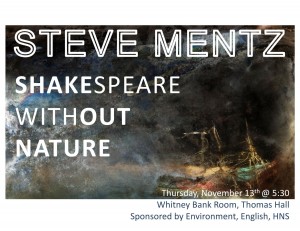 I’m very much looking forward to heading down to Louisiana to talk to the English and Environmental Studies Programs at Loyola tomorrow and Friday. I’ve not been down that way since 2010, when I was a guest of the Williams-Mystic Program and visited the bayou in Cocodrie, the oil-stained beach in Grand Isle, and very briefly New Orleans itself. I’m eager to see Loyola tomorrow, where the English and Environmental Studies are doing such amazing things. Surrounded by memories of Katrina, the BP oil spill, and the inexorable dissolution of the southern parts of the state, they have been building a program, that responds to what they call “Teaching at the End of the World,” as Chris Schaberg talked about at BABEL.
I’m very much looking forward to heading down to Louisiana to talk to the English and Environmental Studies Programs at Loyola tomorrow and Friday. I’ve not been down that way since 2010, when I was a guest of the Williams-Mystic Program and visited the bayou in Cocodrie, the oil-stained beach in Grand Isle, and very briefly New Orleans itself. I’m eager to see Loyola tomorrow, where the English and Environmental Studies are doing such amazing things. Surrounded by memories of Katrina, the BP oil spill, and the inexorable dissolution of the southern parts of the state, they have been building a program, that responds to what they call “Teaching at the End of the World,” as Chris Schaberg talked about at BABEL.
When I was in southern Louisiana in 2010, I heard fascinating presentations from three very different men on Grand Isle about their responses to the oil spill and to Katrina before that. I wrote up three blog posts: “David’s Dolphins” “Chris Hernandez and the Prisonhouse of Story,” and “Moose.” They make interesting reading four years later, as everything changes and stays the same.
My talk tomorrow will be about “Shakespeare without Nature,” with a strong emphasis on the preposition that both connects and displaces. Here’s the opening bit:
The two watchwords of today’s talk, “Shakespeare” and “Nature,” are both complex collective nouns with varied histories, some parts of which are more embarrassing than others. I’ll say plenty about both today, but I’m going to start with the uncapitalized preposition that links them, “without.” The “without” in my title captures my central point, or perhaps my central hope. I’m not quite willing to go as far as Michel Serres in expounding a “philosophy of prepositions” that claims that these little connective words represent the most important features of human language. But the innocent-seeming preposition indicates my desire to disassociate from once-accepted collective ideas about both Nature and Shakespeare. “Without” works in two directions, asking for revisions in our thinking about both capitalized nouns. To be “without-Nature” – imagine now that I’m pronouncing a hyphen between the words – means living in a nonhuman environment that cannot be happily rolled up into a comprehensible collective. That’s the eco-theoretical point I’m building on today. I imagine many of you are familiar with already, having hosted Timothy Morton here a little while ago. Being “Shakespeare-without” – you can hear the hyphen this time, right? – means bringing our engagements with canonical literature outside traditional seminar rooms, lecture halls, and stages. In both cases “without” signals a movement outside familiar spaces into disorderly systems. It’s about mucking around in strange places.
“Without” makes things fuzzy. It deterratorializes. It strips away Romantic ideas of Natural harmony and Harold Bloom-ist fetishizations of the transcendent Bard. Being without does not entail liberation from materiality or textuality, but instead requires a deeper burrowing into these things. To quote one of my favorite novelists only slightly out of context, “this is not a disentanglement from, but a progressive knotting into.” “Without” is the project of this talk. I’ll make some points about both Shakespeare and Nature along the way, but it’s the lever of “without” that does the work. This talk seeks a Shakespeare-without and a without-Nature. The idea in both cases is to go outside.
Hey Steve! The students are raving about the talk. One said she was thinking about “without” all weekend. Two asked about a transcript of the talk–are you planning to post the whole thing?